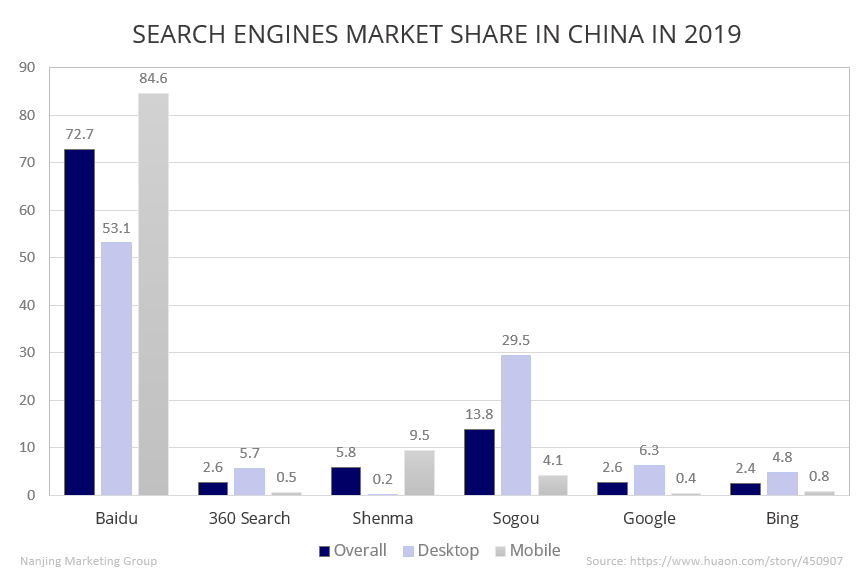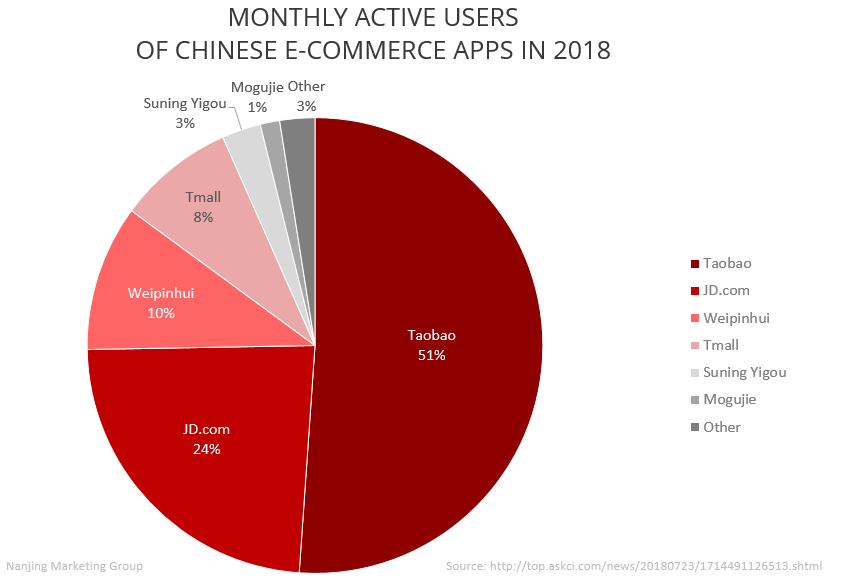Search engine marketing is often one of the first channels that comes to mind when thinking about marketing. That makes sense, by advertising on search engines, you can place your ads in front of people that are searching for what you are selling. But now you’re thinking of targeting the Chinese market, and you heard that Google and some other platforms are blocked. You search for “search engine market in China” on Google, and a name pops up: Baidu! Ah, you are saved! But what if I tell you Baidu is not your only option? No worries though, it will all be clear in a few minutes. Keep reading!
The 4 Big Chinese Search Engines
Well, I am not exactly saying you should abandon Baidu (百度). After all, it is the clear market leader with over 72% of the overall market. However, its dominant position has been challenged by competitors who have appeared over the last few years and now share the market with Baidu.
Back in 2018, Qihoo’s 360 Search (360搜索) was considered a strong challenger. However, the times are changing and the number of mobile search users grows, and 360 goes after a desktop user. When it comes to mobile, Shenma (神马) holds second place, with 9.5% of the market.
But there’s another search engine that has recorded a significant growth last year and it’s Sogou (搜狗), owned by Tencent. What’s interesting about Sogou is that it’s a search engine that is traditionally associated with mobile technology, and while we have noticed a growth in this area over the past year, we have witnessed a bigger increase in the amount of desktop users.

However, don’t jump to any conclusions just yet! As everyone talks about the rise of the mobile Internet, it is easy to decide that everything has to be “mobile-first”. And although we also recommend that you provide your customers with a user-friendly experience with your mobile sites, PC-based campaigns are still relevant. Actually, mobile- and PC-based campaigns should complement each other, especially in the B2B vertical, where we still recommend bidding on desktop users. You should consider primarily Baidu and Sogou, however, 360 may prove successful for companies in more restricted industries.
Let me explain them one by one!
Which Search Engine Should You Choose for a Search Marketing Campaign?
Search Engines in China are ranked based on the size of their userbase. Baidu has the largest amount of users and is therefore the number one choice for companies wanting to work in China. However, for the major brands that want full exposure, we recommend that they have a presence on all four of the main search engines. There’s no reason not to do this if you have the budget as you can reach a much larger audience.
Depending on the number of competitors advertising on certain search engines, cost-per-click will vary by industry. For companies with limited budgets, we recommend comparing options first, and we suggest running a keyword research first to see what is the traffic and the cost in your case. It’s not uncommon for us to encounter campaigns where specific keywords are off-limits, most commonly on Baidu. Doing your research first will give you an overview of what keywords you should bid on, and which keywords may be restricted.
As a matter of fact, 360 Search proves a better ROI in more restricted industries. Why? Because it is more flexible, and for some verticals, it provides more freedom for using certain keywords. It is worth looking into for other reasons. First, 360 is predominantly used by students and young white-collar workers; meaning a younger and more educated audience.
Second, we find that 360 Search is usually cheaper than Baidu on a cost-per-click basis which may be a better option if your company is working with a limited budget. For similar reasons, it is worth looking into Sogou as well.As we mentioned before, has noticed a significant growth both on mobile and desktop devices.
Sogou is a standalone search engine but is also the built-in search engine for Tencent’s apps: WeChat, QQ and the browser. Some users only use the in-app search engine when they are looking for an official account. If during this search they get a website in the results, they are more likely to switch to a regular search engine and repeat the search (not all sites load well in-app). However, it is considered a bit old-fashioned and many users now turn to popular apps and browsers to perform vertical searches to look for news, microblogs, mobile maps, videos, mobile music, and more (source in Chinese).

As of June 2019, the overall number of users across all mobile search engines reached 662 million. It is important to note that when we talk about search engines on mobile devices, we also mean the ones that are built into social apps, such as WeChat.
When it comes to mobile search, apart from Baidu and Sogou, another engine worth considering is Shenma. Shenma’s popularity is due to its functionality; it comes with the UC Browser – the default browser for most Android devices in China which is specifically designed for mobile searches, hence it’s easy to use. One more thing to note is that Shenma is owned by Alibaba Group, so you should also consider it when advertising your e-commerce stores on Taobao or Tmall.
If you are not sure which search engine to choose, there are still some options. First, run keyword research using tools shared by the platform to see what is the search volume and CPC for certain keywords. You may also want to check what search engines your competitors advertise on. You can follow their lead, or promote your product on platforms where your competitors do not have presence at all.
You can also start with Baidu and play around with various campaigns and demographics, mobile and desktop devices; collect data and make a decision based on the raw facts. Once you have all of these, then, you can expand your campaign and add more platforms to broaden the reach.
In our experience, if we run campaigns on Baidu, Sogou and 360 at the same time, we spend 50-60% of budget on Baidu. But it may be different based on your industry.
WHAT ABOUT GOOGLE AND BING?
Google is only available in China for users who access VPN (Virtual Private Network). Does that mean that it’s useless for marketing to Chinese consumers? Not exactly. You can still use Google to target people living outside of Mainland China: exchange students, expats, tourists, etc. But we do not recommend it for campaigns that are targeting Chinese users living within China.
There’s also one foreign search engine accessible in China: Microsoft’s Bing (必应). However, despite being a default browser on many devices, it’s not commonly used by mainland consumers and therefore we do not normally recommend advertising on it.
What About Local Search?

There are two apps that offer strong local search features and these are: Baidu Maps and Amap (高德地图; the default map used by iPhone’s.) And as you can guess, they’re both quite similar to Google Maps.
Within these apps, users can search for specific addresses but also use the apps to discover local restaurants, hotels, shops and services. Both of the apps provide basic info about the place, reviews, prices etc. as they’re connected to platforms like Diangping (点评) and Ctrip.
However, in China, you can also expect users to go straight to the Dianping app and search there instead of using a search engine.
How do Chinese Consumers Search for Products?
Many Chinese users will also skip search engines completely when they are searching for a product to purchase. Instead, they’ll head directly to Taobao, Tmall, Jingdong or another shopping app.

Users are known to commonly switch between search engines and e-commerce platforms, as they research products and brands on search engines, but make their purchase on a platform. This makes it more challenging to get a positive ROI on SEM campaigns for standalone e-commerce sites.
If you’re looking for some guidelines on Chinese marketing, including search, social, marketing plan, etc. check our China Marketing 101 post here.

